Peter MALONE
Saturday, 18 September 2021 19:33
Darling, How Could You?
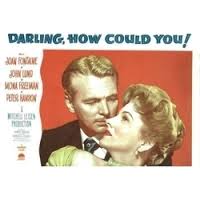
DARLING HOW COULD YOU?
US, 1951,96 minutes, Black and white.
Joan Fontaine, John Lund, Mona Freeman, Peter Hanson, David Stollery, Lowell Gilmore, Robert Barrat, Gertrude Michael.
Directed by Mitchell Leisen.
Darling How Could You? is a pleasant entertainment of the early 1950s. It seems rather dated and sentimental now - but is pleasant and nice. It is based on a play by J. M. Barrie, Alice Sit By The Fire. Paramount also adapted his play
Rosalind at this time, as Forever Female with Ginger Rogers and William Holden. Other Barrie plays filmed include Peter Pan, Quality Street, The Little Minister and The Admirable Crichton, Joan Fontaine is attractive in the central role and receives good support from John Lund. Mona Freeman is particularly good as her theatrical and romantic daughter. There are some amusing points made about the influence of theatre on impressionable youngsters. Direction is by Mitchell Leisen, who worked for many decades at Paramount.
1. A satisfying '50s entertainment? Romantic comedy? Pleasant and nice? Period? Sentiment? The contribution of the stars?
2. The work of J. M. Barrie - its fey quality? Adaptation to the United States? The work of Mitchell Leisen?
3. Black and white photography, Paramount sets, creation of the turn-of-the century period? The glimpse of Broadway theatre? Homes? Medicine? The score?
4. The theatrical nature of the film - the presentation of the Broadway play, Amy's response to it? The humour of the influence of melodrama on impressionable audiences? The use of the patterns of the melodrama and the style within the actual story? The play and its devices, the exaggerated acting styles. Amy's response, Charlie's questions? The mid and the opening of the film and her hurrying to rescue the children? A source of parody and humour?
5. The Gray household? The dedication of mother and father in Panama? Their absence so long from home? The nurse and her attachment to the baby? The maid and the household? The children not knowing their parents? The emotional build-up to their return? The humour of the preparations? The pathos of their not knowing their parents? The contrast with Alice and Robert on the boat trip - and Alice's attractiveness for the passengers at the dance? The setting of the scene for audience interest in the homecoming?
6. The return: Robert and his success with everybody, Alice and the baby crying, Charlie not wanting to be hugged, the nurse and her surliness? Robert's advice about emotionalism and her distance with Amy and her making a mistake? The mannered behaviour of Alice? The creation of tension? The meal sequences etc.? The unpacking?
7. Stephen's phone call and Amy's interpretation? Her plan to rescue her mother - dressing, Alice singing to Charlie, visiting Stephen, bewildering him, the hiding in the cupboard? The complications and ironies with the arrival of Robert and Stephen's explanation of things to him? Alice's arrival? The farcical aspects of the exposure? The children taking sides? Clearing the issue? Robert and Alice having to pretend so that the children would defend her?
8. The family getting to know one another - the future? The points made about children's attitudes and feelings?
9. The character of Stephen, friendship, his bewilderment with Amy, his bad handling of the situation - with the touch of vanity?
10. Themes of family, humour, decency, an old world and its values - delightful and nice?
Published in Movie Reviews
Published in
Movie Reviews
Tagged under
Saturday, 18 September 2021 19:33
Dark Victory/ 1975

DARK VICTORY
US, 1975,150 minutes, Colour.
Elizabeth Montgomery, Anthony Hopkins, Michele Lee.
Directed by Jules Irving.
Dark Victory was originally a Bette Davis vehicle of the late '30s. It became a classic romantic sentimental drama. It was remade in the '60s as a vehicle for Susan Hayward - with an English setting. The film was not as popular as the original. The film was remade (at rather great length) as a telemovie in the '70s. Elizabeth Montgomery gives an attractive performance in the central role. Anthony Hopkins is both tender and strong as the doctor. There is excellent support from Michele Lee in the Geraldine Fitzgerald role. The film has the glossy atmosphere of Universal telemovies of the '70s and is set in affluent advertising world. The gloss of the production highlights the basic soap opera ingredients and style of the story.
1. Entertainment, impact? A cinema classic transferred to television? The memories of the classic? The effectiveness of the updating?
2. The style of the updating? Comparisons with the original? The world of television, business executives? Busy feminist American style of the '70s? Work, wealth? Friends and society? Los Angeles? Colour photography and the lush style, the beach, the house? The visual impact of affluent homes etc.? The romantic score - especially for relationships, crises, death?
3. The length of the telemovie: the padding of the original? The drawing out of the story for mood? The impact for home audiences -attention and feeling?
4. The strength of Elizabeth Montgomery in the central role? Her television popularity? Her sustaining of the star role? vivacity, credibility? The experience of death?
5. The character of Katie: establishing in her work. toughness, attention to detail, the early indications of her illness, the cinematic device of blurring of vision (and audience sharing her experience), the puzzle. her hard style, the party and her harsh behaviour, the fall, the hospital, the tests. the staff reaction? The treatment and her reaction e.g. to her hair?
6. The operation and its detail, the feel for the hospital, surgery? Its success? The focus on the surgery, expertise? Temporary success? The anguish of wondering whether the operation was ultimately a success?
7. Katie as a new person: her confidence, appearance, going out, joy, falling in love, the house, her work? Her discovery of the truth?
8. Her reaction to the truth? Her damning others? The drink, self-pity? Jeremy? Her criticism of Dolores? The growing crises?
9. Her marriage, coming alive, accepting her illness? New hopes, the party, jealousy, her fighting Michael, the importance of fighting back, work, home? Her phone call at the time of her death: the walk, the smile? Her ability to experience and handle her dying?
10. Anthony Hopkins as Michael? His place at the party. professional opinion, decisions? The surgery? The outings and his care for her? Concern. love? The decision not to tell her the truth? The effect of her discovery? The reuniting? Marriage, jealousy, tears? His support at the end?
11. Dolores and the sketch of a friend. helping and sharing. the truth. her being condemned as a sneak? Her love for Katie and helping her?
12. The sketch of Jeremy and the background of the television studios, her work? A sounding board?
13. The world of television? The TV crews, the staff? Crises in Katie's performance?
14. Audience interest in hospitals? The film's attention to detail: wards, surgery, recuperation?
15. The possibility for audiences to identify with characters in an affluent society? The affluence giving the tone of sentiment and soap opera? Larger than life?
16. The exploration in romantic drama of the reality of illness and death? The business world, the brittleness of relationships, the need for tenderness, crises and the possibilities of changing? The work of Elizabeth Kubler- Ross and the stages of reaction to death from anger to acceptance? The importance of happiness in this life - as seen in the context of death? The justice and injustice of terminal illness? The impact on the dying person? Her effect on those she loved and who loved her?
Published in Movie Reviews
Published in
Movie Reviews
Tagged under
Saturday, 18 September 2021 19:33
Dark Star
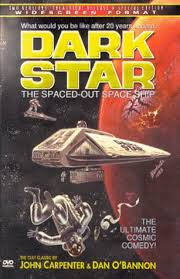
DARK STAR
US, 1975, 82 minutes, Colour.
Brian Narelle, Dan O'Bannon.
Directed by John Carpenter.
Dark Star has achieved cult status and is shown as specialist theatres. It has made its television appearance ~ perhaps with some puzzle for viewers.
It began as a study film for writer, director, composer John Carpenter in collaboration with Dan O’Bannon?. Enough money was found to develop it into a feature length film. John Carpenter continued to make experimental films outside the studio system and achieved international success and reputation with such a range of genre films as Assault on Precinct 13, Halloween. He then went on to make such features as The Fog and Escape From New York. In the meantime he made telemovies: Someone's Watching Me, Elvis.
Carpenter is a multi-talented writer-director. He has a great knowledge and admiration for genre films and incorporates these into all the films he has made. He also composes the music and songs. Dan 0"Bannen was to continue in science fiction film-writing - most especially with Alien which has its anticipations in Dark Star.
Dark Star was more influenced by 2001 and such television series as Star Trek -it anticipated the revival of interest in space with Star Wars and its successors in the late '70s. Dark Star is made very much with tongue in cheek - an imitation and tribute to the B-grade science fiction of the '50s and '60s but with acknowledgement to the influence of 2001. It has a cleveristic attitude of students in its screenplay - an ability to parody and mock as well as to incorporate the virtues of, for example, Kubrick's philosophical reflections on human nature and the exploration of space. The film is thus a blend of the serious and the deadpan - with excellent special effects. The film dates somewhat, especially in the light of the space trend of the '70s and '80s. However, as an example of small budget film-making with creative inventiveness it is well worth seeing. It is also very enjoyable.
1. The quality of the film, the work of John Carpenter as writer, producer, director? Musical composition? Its contribution to the development of science fiction features? Its entertainment value?
2. How evident is it that it is a student film: screenplay, ideas, the science fiction of the B-films of the '50s, the influence of 2001 and Star Trek, the philosophising about man's condition? Parody and humour? Technical expertise and inventiveness?
3. Colour photography, special effects: space, the Dark Star itself, asteroids and bombs, the technological hardware of spaceships, the mock humour of the alien as a beach ball with claws: small budget success? The devices of editing for moods and special effects? The score, music, the Muzak type music for life in the spaceship, dramatic and melodramatic music? The theme song of Benson Arizona - especially in the finale?
4. The makers' delight in small budget science fiction, space exploration, technology, human lifestyles in space, dramatic intergalactic crises, interpersonal crises?
5. The parody mentality: 2001, Star Trek - leading to Star Wars and Alien? The blend of the pulp and the serious? The look of the '70s and the trends of the '70s in behaviour, language? The anticipation of the future? The particularly U.S. style of the film and the characters? The indications of technological takeover? The humorous presentation of philosophy - especially in the Descartes philosophy discussions with the bomb?
6. The style of the prologue: the bland message from Earth to the astronauts, their situation, long time in space but not ageing quickly? American space programme and support - Congress and money, the curbing of programmes and cutbacks, the moral support? Commander Powell's death - and the later revelation of his preservation and hibernation? The four astronauts as the cross-section of America? The semi-serious and mock tone?
7. Dark Star as the space vehicle - the title of the film? The film's focus on it - visuals, exteriors and interiors? Its rushes through space and immediate capacity for dead-stopping? The smooth woman's voice for the computer? The talking bombs? Laser.~- and mistakes? Futuristic food, games, records, sun rays? Gun practice? The contemplation of the vast areas of space? The alien? Perils in the lift shaft? Explosions? The irony of the dark star being ultimately destroyed?
8. The parody of space missions - to blow up stars rather than explore? The presence of the bombs on board? The talking bombs? Asteroids and magnetic fields? Being lost in space?
9. The alien thing - its being introduced to the Dark Star, its being stored, fed? The beach ball look and its tapping its claws? Its aggressive attacks? The jokes about the alien - but its deadly menace especially for Pinback in the lift shaft?
10. Doolittle (his name) as commander? The death of Commander Powell before the film starts? His easygoing nature, relationship with the others, needing to speak? Enjoying blowing things up? His discussions with Talby in his contemplation tower? His arguing with the bomb after consulting Powell? The serious humour of his resurrecting Powell and talking with him? The use of phenomenology and philosophical discussion to argue with the bomb? The desperate countdown as regards the bomb's going off? His decision to rescue Talby? His discussion about surfing - and the final humour of his using the wreckage of Dark Star for surfing in space?
11. Talby and his alienation from the group, not coming to meals, his being affected by Powell's death, his contemplating the universe, his decision to fix the laser, his being lost in space, his joy in being absorbed by the Phoenix asteroids which he had longed to meet?
12. Boiler and his gruffness, the ordinary type, ignoring people, his shooting practice?
13. Commander Powell and his being preserved after death - his being resurrected, his comments on life after death and difficulty in concentrating, his instructing Doolittle in the art of dealing with bombs?
14. The bomb and its voice - its obeying commands, its irritation with mistaken commands, its arguing? The ironic humour of man arguing philosophically with the bomb? The bomb then using its reason to assume that it alone existed, was God-like, could set itself off - and thus destroy everyone?
15. Computers - the sweet hostess voice, her talking to the astronauts, her explaining failures?
16. Man and his achievement, his fallibility, his work in space, its effect on his ordinary human life style? Mistakes in space - Pinback not even being the real Pinback? Men wandering for twenty years? Dealing with bombs - which ultimately outwit them (even philosophically)?
17. Satisfying entertainment with point?
Published in Movie Reviews
Published in
Movie Reviews
Tagged under
Saturday, 18 September 2021 19:33
Darker Side of Terror, The
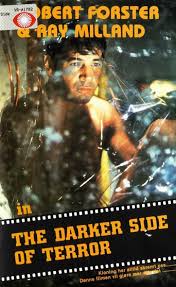
THE DARKER SIDE OF TERROR
US, 1979, 91 minutes, Colour.
Robert Forster, Adrienne Barbeau, Ray Milland.
Directed by Gus Trikonis.
The Darker Side Of Terror is quite a good telemovie - it might even have been better. It has a good cast - Ray Milland looking his most worried as a scientist who can clone people, Robert Forster as the bewildered hero - and his clone, Adrienne Barbeau as the puzzled wife. While the film has a scientific background and exercises imagination on cloning and its disastrous effects, it is really an updated version of the Dr. Jekyll and Mr. Hyde story. The ordinary scientist is Dr. Jekyll - the clone is Mr. Hyde who is evil and wants to take possession of and destroy the original. With the scientific background, the university atmosphere and its rivalries, scientific experimentation, the film is an interesting example of how the traditional horror genres can be incorporated into contemporary settings.
1. An entertaining thriller? Horror movie?
2. How well did the film use the horror conventions? The scientist and the variation on the mad scientist with eerie laboratory sequences? The variation on the creation of a monster in the Frankenstein vein? The importance of the Dr. Jekyll and Mr. Hyde tradition with the evil character emerging from the good? A contemporary blend of these conventions? Persuasively handled and communicated? For how television viewing?
3. The atmosphere of an American university, the American home? The ordinariness? The contrast with the laboratory, experiments, the impersonal nature of laboratory technology? The abandoned laboratory and its eeriness? The special effects - especially for the making of the clone? The presence of the two men and their confronting each other? Musical score for atmosphere?
4. The basic plausibility of the plot: scientific experimentation, general information about cloning, its possibilities? For what purpose? Playing God with nature and the hellish consequences? The background of university, home, rivalry, scientific experimentation? Ambition? The plausibility of the sequences with the two men and the clone on the loose? The transition to police drama and murder thriller? The build-up to the final confrontation?
5. The hero: the scientist with his future before him, his not being named to the Chair of Science, the rival stealing his material? The elder scientist urging him on? Taking risks? The obsession with success? The background of the happy marriage and the conventional home scenes? The making of the clone? The education of the clone? The similarities of the two men? The differing gestures - especially the laugh? The clone having a life of its own, breaking free, sexual drives, the murder of the girl? The clone taking the husband's place and the relationship with the wife? The build-up to the confrontation and the necessity of the killing of the clone? The inherent violence - the killing of the rival, the killing of the older doctor? Clones being controlled - but breaking out of control? The impossibility of man playing God?
6. The older doctor: his ambitions, obsession, success with cloning, regrets, poetic justice in his death?
7. The wife: her support of her husband, sharing his disappointment, the alienation because of his experiments, the encounter with the clone and the healing of the marriage? The irony of the clone taking the place of the husband and a husband?
8. The ambitious scientist: his lack of scruple, his death?
9. The girl and her encounter with the clone, the violence of her death? The regrets of the clone? His shrewdness in breaking out, returning? Pretending that he had not been out? His taking the husband's place?
10. The detective and his interviewing the husband? The crisis of identity and the dilemma of the hero having to kill alter-ego?
11. How well did the film work on the popular level of entertainment, horror, thriller? How well did it indicate, at a popular home level, themes of scientific progress in conjunction with human values and dignity?
Published in Movie Reviews
Published in
Movie Reviews
Tagged under
Saturday, 18 September 2021 19:33
Dangerously They Live
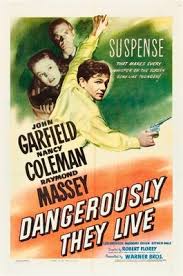
DANGEROUSLY THEY LIVE
US, 1941, 77 minutes, Black and white.
John Garfield, Raymond Massey, Nancy Coleman, Moroni Olsen, Lee Patrick.
Directed by Robert Florey.
Dangerously They Live is a small B-budget Warner Brothers film, a story of espionage in an American city, a piece of World War Two propaganda. It has a genial performance by John Garfield - a bit unlikely as a doctor. Nancy Coleman is the attractive heroine. Raymond Massey is, as always, an effective villain. The film was directed by Robert Florey who made a range of films at Warner Brothers at this time ranging from God Is My Co-Pilot? to The Beast With Five Fingers.
1. Entertaining B-budget thriller? Espionage? The atmosphere of World War Two? Propaganda?
2. Black and white photography, the city, the house, light and darkness, shadows, moody atmosphere? Musical score?
3. The title and the focus on infiltrators and spies? Spies on the Allies' side? The doctor involved in this espionage tangle?
4. The plausibility of the story? The British and their -intelligence? Information about flights and ships? The use of personnel to convey messages? The Fifth Column, the infiltration into the United States, even to high places? The wealthy Mr. Goodwin and his house? A concentration camp? The melodramatic violence and activities? The repercussions for the bombing of the U-boats?
5. Jane and her work, the taxi; accident, her pretending amnesia, the help of Mike Lewis, the fake father, Professor Ingersoll, her trying to persuade Mike to be on her side in the hospital, the decision to go into the danger area, her going to the house, her skill in feigning amnesia, her being exposed, the confrontation with the father, with Professor Ingersoll, her being drugged, giving part of the information, her love for Mike, ensuring his help and getting information, her fearing him dead, the final escape? A romantic ending with the patriotic touch? A credible spy?
6. Mike as the doctor, in the ambulance, ladies, man, genial, interest in amnesia, relationship with Jane, not believing her, being on her side, Mr Goodwin, admiration for Professor Ingersoll? Going with her, trying to find out the truth, his techniques? In the mansion, being virtually a prisoner, not being allowed out, his investigations? Helping Jane? The man with the dislocated arm? The escape, getting the police, Inpersol’s smoothness? His being kidnapped? His getting out of danger, rescuing Jane? The romantic ending?
7. Mr. Goodwin and his wealth, the Nazi contacts, his house, the servants and the gardeners, the concentration camp? His pretences with Jane?
8. Professor Ingersoll and his position, Mike's admiration for him, being the Nazi chief, his suave manner with Jane and Mike, the interrogations, the information, the confrontation with the radio, his defeat?
9. The presentation of the Fifth Column, the types, their pressure on Mr. and Mrs. Steiner (and Steiner's death)? Mrs. Steiner getting the police? The various servants and their strong-arm tactics?
10. The credibility of this kind of espionage story in an American city? Its Impact in the '40s for propaganda motivation? As an entertaining spy story later?
Published in Movie Reviews
Published in
Movie Reviews
Tagged under
Saturday, 18 September 2021 19:33
Dangerous Days of Kiowa Jones, The
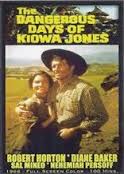
THE DANGEROUS DAYS OF KIOWA JONES
US, 1966, 100 minutes. Colour.
Robert Horton, Diane Baker, Sal Mineo, Nehemiah Persoff, Gary Merrill, Robert H. Harris, Royal Dano.
Directed by Alex March.
The Dangerous Days of Kiowa Jones is a brief, effective western. It has conventional action material, a young man by circumstances taking two criminals to justice. He is beset by the expected difficulties and is helped by the leading lady, Diane Baker, in a very good strong and unglamorous role. The film is interested in character study and shows the effect of the situation on the two leading characters as well as on the criminals, a psychotic killer played by Sal Mineo and a benign gypsy played very well by Nehemiah Persoff. An enjoyable and interesting western.
1. An effective western? Audience expectations of the West, action, adventure, heroes, villains, justice, law and order, dangers, violence?
2. The conventional outline of the plot: the young wanderer and his encounter with the sheriff and the criminals, his choice, his sense of justice taking him through difficulties, the encounters with bounty hunters, with vengeful families, with the difficulties of the terrain? The portraits of the people of the West? How well was the conventional material presented, with what depth?
3. Colour photography and the atmosphere of the West, studio sets for the camp sequences? Musical score, the title song?
4. Audience interest in and involvement with the characters? The expectations of the basic plot and of the success of the trek? The credibility of these characters in the West, the administration of justice, the dangers, greed? Guns and violence and inevitable death?
5. Kiowa Jones as hero - the introduction to him, the song during the credits, the dilemma with the handcuffed criminals and the sick marshal? His deciding to believe the marshal? His being deputised - but his not wanting the reward and his consistency in refusing the money? Why? His friendship with the marshal, helping him, the effect of the marshal's death? His interaction with the two criminals? Wilkes and his continual jibes, offering money, the ambush with the two bounty hunters and Jones' success? The encounter with Amilia and discussion, her return, the setting of the gypsy's leg? Her agreeing to take them in the wagon? The encounter with the vengeful family, the turning of the tables and the gypsy's continual help of Jones? The effect of killing the old man on Jones? His antagonism towards Wilkes, his despising Wilkes especially for using Amilia and then his wanting to kill his attackers? The encounter with the hangman? The final difficulties and reaching the goal? The discussions with Amilia,, sharing of their opinions, the rather formal proposal and the prospect of a happy ending and its credibility?
6. Amilia as heroine - wandering the West like Jones, the prim schoolteacher, resourceful, being handy with the gun, warding off the bounty hunters, returning and helping with the gypsy, the sharing of the experience with Jones? Her foolishness during the siege when Wilkes had the gun? Her acceptance of Jones' proposal?
7. Wilkes as the manic killer, the young gunman with the multiple killings? His attack on the marshal, trying to bribe Jones, his hoping to be rescued by the bounty men, the effect on him of almost being lynched, his attacking the hangman after listening to his story, the confrontation but his being thwarted by the gypsy? The prospect of the administration of justice? A detailed portrait of the nervy and psychotic killer?
8. The contrast with the gypsy and the emergence of his story, his hurting his leg, his helping Jones, his being shot by Wilkes? Poetic justice and his dying to save others?
9. The gallery of minor characters and the way these were drawn - the marshal and his sense of duty even to death. the bounty hunters and their relentlessness, the hangman and his long story about his machine and his pride in it, the father and the two sons with their vengeance and lynching?
10. Themes of violence, law and order, lynching?
11. Thews of relationships, shared experience, marriage?
12. A satisfying western, at entertainment level, with insight into the American heritage of the West?
Published in Movie Reviews
Published in
Movie Reviews
Tagged under
Saturday, 18 September 2021 19:33
Dangerous Davies
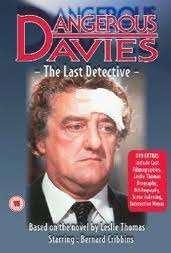
DANGEROUS DAVIES
UK, 1981, 106 minutes, Colour.
Bernard Cribbins, Bill Maynard, Bernard Lee, Joss Ackland, Maureen Lipman.
Directed by Val Guest.
Dangerous Davies is a British telemovie - an enjoyable and interesting police and detective story. It contrasts with some of the more spectacular television series of the '70s and '80s: The Sweeney, The Professionals. Bernard Cribbins has a very good role as Davies, an ordinary kind of policeman who solves the mystery. There is an excellent supporting cast.
Direction is by Val Guest, a veteran of the British Film Industry since the '30a - as writer and as director.
1. An interesting and entertaining police story, mystery? The London and British atmosphere and style?
2. The popularity of the police in television series in the '70s and '80s? Praise of the police? Criticism of corruption? American styles? British styles? The picture of crack squads, daring action? The cynicism about police corruption and the critique? The influence on this film?
3. The atmosphere of London: locations, authentic atmosphere? The pace? The style of the flashbacks and their sepia tone? Action sequences? Musical score?
4. The setting: the investigation, the mystery, the characters, types, police work? Dangerous and his friends? The establishing of the situation for audience interest?
5. The structure: the one story of the investigation to two stories about the present and the past? The insertion of the flashbacks? The audience experiencing the techniques of detective work? The puzzle, the clues, the pieces? The search for more information? Danger? The breaks? The conclusion? Audience interest maintained in the investigative style?
6. Bernard Cribbins' personality as Dangerous? In himself, policeman, detective, his age, skills in work? The ordinary man? His integrity? His dog and the humour of the companionship of the two? His old friend - almost the equivalent of a pet dog! His interest in people, compassion? His humorous style? Straightforwardness? Capacity for meeting people, eliciting information? His strength, action? violence and his receiving violence? Drinking? His being put on the case, gaining momentum in his investigation? As a character, qualities, credibility?
7. The murder in the past: Celia, family, friends, the club with the teenagers, sexual relationships, her body being unearthed? The reconstruction? The death and the revelation? The investigations, the police cover-up? The point made about 15 years passing and people's tongues being looser because not so afraid of consequences as they were at the time?
8. The sketch of the family: the mother and her caution, the drink with Dangerous, the information? The father and the bashing? The sister and her supplying clues? Sending for the police? Celia's reputation? The rehabilitation of her reputation? The Catholic background?
9. The group having grown up and the picture of their subsequent lives, marriages? Ena and her deductive style, drinks? Bill and his being called William? His having Celia's panties? The trunk? The supplying of information?
10. Boot and his running the sex shop, the photo, his friend in the sex shop, the train-ride?
11. The policeman and his wife, his being in the asylum, thinking himself Peter the Great? The information from Tarantella? His relationship with her? The discovery of the bike?
12. The visit to Bristol and the old man, his story and the information about the information about the identity of the killer?
13. The man belonging to the Salvation Army, his past, his religious conversion?
14. The background of criminals in London? The contemporary story and its link with the past?
15. The police, the patrol, the party, the drinks, the cover-up? The policeman with the information and his posting his letter to himself? Its being unsealed?
16. Police officials, their integrity, the investigations? The irony of the presentation of the medal to Yardbird?
17. Yardbird in the background of the story? His attitude towards Davies? The irony of the revelation of the truth?
18. An atmosphere of realism, authenticity? Experience of human nature - criminal activity, ordinary activity, violence, murder?
Published in Movie Reviews
Published in
Movie Reviews
Tagged under
Saturday, 18 September 2021 19:33
Dandy in Aspic, A
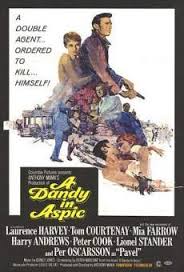
A DANDY IN ASPIC
UK, 1968, 100 minutes, Colour.
Laurence Harvey, Tom Courtenay, Mia Farrow, Peter Cook, Harry Andrews, Lionel Stander, Per Oscarsson, John Bird, Norman Bird.
Directed by Anthony Mann (and completed by Laurence Harvey).
A Dandy in Aspic dates from the late 60's when the cinema had undergone a spate of James Bond movies and an enormous number of spoofs on spies with even Doris Day getting into the act. But Le Carre's The Spy Who Came in From the Cold started a new trend in 1965, the anti-spy movement. The glamour was played down even though some of the excitement was retained. However, disillusionment and the ugliness of man's manipulation of man was the general tone of a series of films including The Executioner, The Looking- Glass War, The Naked Runner, The Kremlin Letter. A Dandy in Aspic fits into this category, the image behind the credits at beginning and end showing a puppet on a string.
This is quite a stylish film concentrating on clashes of personality rather than thrills or spectacle. Laurence Harvey gives a performance that is characteristic and yet nuanced differently from his other films. Tom Courtenay is once more a savage, feelingless, relentless spy. There are some cliches and corny dialogue, especially in the Mia Farrow sequences, but the film grows on the audience and the ending puts the spies out in the cold.
Popular director, Anthony Mann, (The Fall of the Roman Empire, E1 Cid, The Heroes of Telemark) died while making the film and it was completed by Laurence Harvey.
1. Just another spy film? Why?
2. What were the implications of the puppet imagery at the beginning and end of the film?
3. The film opened with a funeral and ended with two deaths. How important was death as a theme of the film?
4. Was it credible that Eberlin-Kraznaven? should have been able to live as a double agent for 18 years and kill some of the best British agents?
5. What was the effect of this double life on Kraznaven? Why did he want an identity? Why did he want to go back to Russia? Why was he not allowed?
6. Was the dandy, Eberlin, in any way the true Kraznaven or had he submerged whatever personality he had into Eberlin?
7. What kind of man was Pavel? What was the effect of the life of espionage on him? Did he want to die? Did he want Kraznaven to kill him?
8. Did you think that the British knew the identity of Kraznaven all the time?
9. What was the point of the girl in the film? Did you think she was an agent of some kind? Did Kraznaven come to love her? Why?
10. What image of the spy did Gatiss give? What kind of a man was he? What was wrong with him?
11. Why wouldn't the East Germans allow Kraznaven to enter?
12. How did you think the whole affair would end? Did you think the Russians would betray Kraznaven? How did the film make the audience share the spy's uncertainty and tension?
13. Was Peter Cook's jovial Prentiss just comic relief or did he convey something of the deceptive personality that a clever spy should have?
14. What did you think of Gatiss's use of the racing accident to shoot Harry?
15. Why did Gatiss defy Kraznaven to kill him at the end? Could the film have ended any other way?
Published in Movie Reviews
Published in
Movie Reviews
Tagged under
Saturday, 18 September 2021 19:33
Damien the Leper Priest
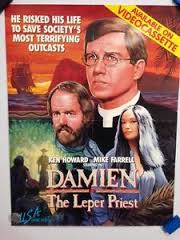
DAMIEN THE LEPER PRIEST
US, 1980, 100 minutes, Colour.
Ken Howard, Mike Farrell, Wilfrid Hyde White, David Ogden Stiers.
Directed by Steven Gethers.
Damien the Leper Priest is a tribute to Fr. Damien of Molokai, the famous missionary of the 19th. century who worked amongst the lepers in Hawaii and eventually contracted the disease. He is a candidate for canonisation. Many biographies have been written of Fr. Damien, most notably for the English-speaking world, a '40s biography by film director John Farrow.
The film is a blend of the reverent and the down-to-earth - but is presented in the Reader's Digest summary style. Attractive locations, an atmosphere of the leper colony (though generally nice and spruce), and an attractive cast makes the film enjoyable entertainment, giving information about Fr. Damien easily if not in depth. David Janssen was to have played Fr. Damien but died before the film was made - it is dedicated to him. Ken Howard fills the role - perhaps uneasily. Wilfrid Hyde- White makes an unlikely Bishop. David Ogden Stiers and Mike Farrell have taken some time out from M*A*S*H to appear in central roles.
An easy-to-take telemovie treatment of a significant priest.
1. The impact of the film? Audience knowledge of Father Damien? Of 19th century missions? Of Hawaii? Of the disease of leprosy and its effects?
2. Hawaiian locations, the atmosphere of Molokai, 19th. century, the mission, the squalor, Fr. Damien's improving the mission? The musical score?
3. The presence of Fr. Damien - the 19th century missionaries, his Congregation of the Sacred Hearts of Jesus and Mary, their appointing him to Molokai? His arrival and the words of the Captain? The missionary's leaving quickly? His wariness in touching the lepers? His arrival, looking around, the broken church, hospital conditions: His less than compassionate attitudes in asserting that he was the priest? His gradual change? Involvement with the people? Getting the timber, building the church, changing the hospital conditions? His pleading his cause? its becoming well-known? His work with the Hawaiians, the recognition by the Queen and the bestowing of the honour? The attitude of the Bishop? His relationship with the superintendent, his aloofness, getting him involved? With the doctor? The new curate and his attempts to change everything? His visit to the Bishop? His success on Molokai,
its becoming well-known? The effect on him personally? The relationship with Robertson, the girl, her pregnancy, the arranging of the marriage, Robertson's suicide? Fr. Damien contracting leprosy, the doctor knowing? The Bishop wanting him moved - because of the leprosy having to go back to Molokai? The American photographer and the journal of Fr. Damien's illness? His death? Not wanting the church painted?
The tribute to Fr. Damien? How well did the film explain the man, his mission, dedication? His long time with the Hawaiians? Contracting the illness and dying? His cause for canonisation?
4. The picture of leprosy in the 19th. century, the physical aspects, health, illness? The loss of limbs? The segregating of the leprosy victims? Their life on Molokai? Initial drabness? Fr. Damien getting them moving, building the church, establishing a community, industries? Their pride and self-assertion? Their love for Fr. Damien, worship, their working with him? Sequences like the painting of the church?
5. Robertson, his illness, being present on the island, his scepticism? His relationship with the girl? Her pregnancy, the marriage? The Catholic marriage? Their night together, happiness? His killing himself? Fr. Damien's words at the funeral?
6. The Bishop and his wily attitude towards leaving Fr. Damien there? Getting him help? Affirming his work? His successor and his interview, a stricter attitude and moving Fr. Damien? The curate and his eagerness, wanting to change everything and people's complaints? His wanting to be moved?
7. The doctor and his friendship, help with the work, diagnosing Fr. Damien's illness?
8. The photographer, the experience of the Civil War, wanting to work, Father Damien's fame, his taking the photographs of Fr. Damien's illness?
9. The superintendent and his aloofness, fears, his gradually being won over and becoming involved with the lepers?
10. A portrait of a significant 19th. century priest? His being well-known? His cause? Leprosy and the elimination of leprosy?
Published in Movie Reviews
Published in
Movie Reviews
Tagged under
Saturday, 18 September 2021 19:33
Dame Du Bois De Boulogne, Les

LES DAME DU BOIS DE BOULOGNE
France, 1945, 85 minutes, Black and white.
Directed by Robert Bresson.
Les Dames du Bois de Boulogne was Robert Bresson's second film and its slight story with its presentation of interior struggles was difficult for audiences on its first release. It is a difficult enough film to appreciate now, but we are more familiar with its techniques.
Bresson is considered by many to be too much of an intellectual, too much of a moralist, too much of a Catholic. His films have a certain hard Gallic intensity that makes them powerful studies rather than entertaining parables. Comparisons could be made with his short film Pickpocket or his Trial of Joan of Arc and also with the moral fables of director, Eric Rohmer, My Night at Maud's or Claire's Knee.
The characters in this film represent attitudes, especially of good and evil and the film is constructed almost like a morality play with the hero between two women who represent the forces of good and evil. whose appearances are equally deceptive. And evil wins in a harsh, destructive way.
1. Bresson is considered to take more interest in interior life and struggles than external action. Is this true of this film?
2. What happens to Helene as a person throughout the film? What happens to Jean? What happens to Agnes?
3. How evil was Helene as a person? Was she completely malicious intending revenge and destruction, or was she merely playing games with people's lives?
4. How were Helene's inner sentiments expressed in her face and makeup? Is this true of Agnes?
5. Was Jean callous when he responded to Helene's breaking up of their affair? Was he a man of depth?
6. Is it too fanciful to see the film as a modern morality play of a man tormented by and moving between good and evil and of good made the tool of evil?
7. Did you find the film entertaining? Were you absorbed by the action? Why? or did you find yourself observing the action and seeing the characters representing particular points of view?
Published in Movie Reviews
Published in
Movie Reviews
Tagged under